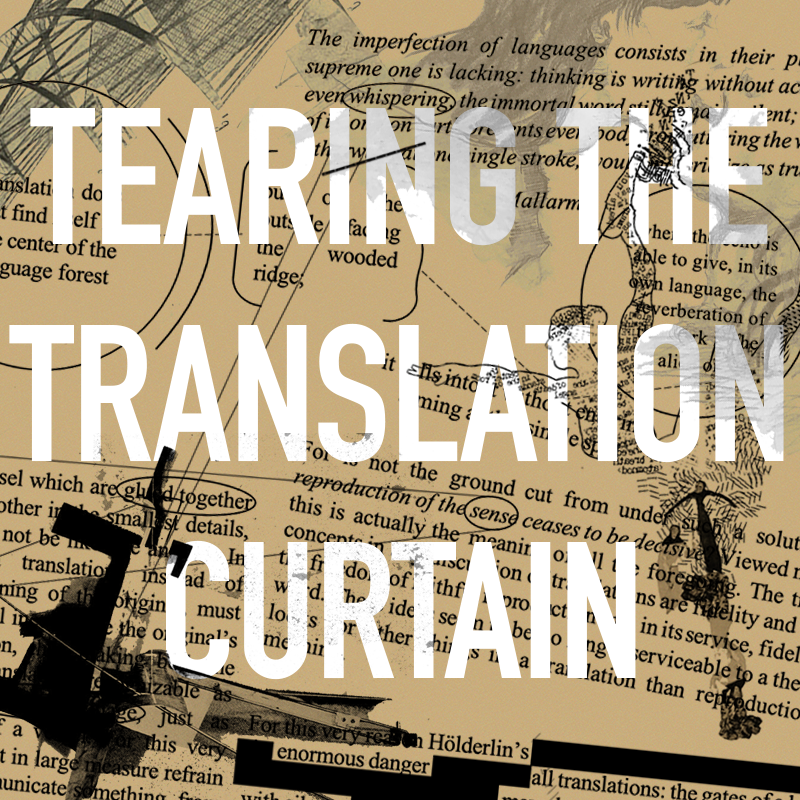Tearing the Translation Curtain: Homophonics & Heteroglossia
[a 6-week online program via zoom; Sundays at 1 pm EST; begins 4/11]

“Thing Language”
by Jack Spicer
This ocean, humiliating in its disguises
Tougher than anything.
No one listens to poetry. The ocean
Does not mean to be listened to. A drop
Or crash of water. It means
Nothing.
It
Is bread and butter
Pepper and salt. The death
That young men hope for. Aimlessly
It pounds the shore. White and aimless signals. No
One listens to poetry
This workshop is for anyone and everyone! It is, essentially, designed to rupture translation (that is: rupture, is rapture, wrapped, rapt), but requires no prior experience or familiarity with any of the words or processes mentioned here. All will be explained! It’s a place to play, explore, tear apart and put back together.
Mathilda writes: “It is already a common framework, thanks to Benjamin among others, that all translation is feeble, is “white and aimless signals,” and despite this belief I find that these criticisms still plague radical translators. Where is the money here? A homophonic translation is antithetical to exchange value (this does not mean they have not been sold, but that) such translation refuses to enter into conventional semio-economic exchange, “One word does not equal another. Language is not a medium of equivalence,” (P. Inman). This course begins with the translational experiments begun with the modernists, the Zukofskys prime among them, and aims to move from “translation” as an anchoring point toward broader linguistic strains. This move can be typified in the lifework of David Melnick, from Men in Aïda back to Pcoet, where the work of P. Inman and Ava Hoffman will then ground and unsettle us.
Tearing Translation encourages interruption, so any plans outlined here in the syllabus are welcome to alternatives and additions, subtractions and sublations. If I’ve overlooked a poet or my own linguistic schema has caused me to ignore a period of work you’re interested in: bring them up, bring them in. Each week’s reading will consist in part of theoretical and practical texts (the first week has us reading Benjamin in conjunction with the Zukofskys). The hope is this will encourage a more direct synthesis of material as we encounter it, and students are encouraged to fracture and disrupt and intervene with their own practices and findings.
This course requires no formal linguistic training (I have none), and neither does it require any “proficiency” in a language other than your own. I ask only for you to be willing to engage in nonsense, to listen and misunderstand. None of the modernists could actually read Mandarin. The only language I’m comfortable in outside English is German, so while that is where most of my work has taken place I’ll encourage us to seek new and defamiliarzing experiences. From Pallaksch to xenoglossia, neologism to tongues, zaum to Babel, etc.
If I say μῆνιν ἄειδε θεὰ Πηληϊάδεω Ἀχιλῆος and you say “Men in Aïda, they appeal eh? A day, O Achilles” this is just as well as “Maine in our aid, eh Theo? Pale lay a day, oh ache in Laos.” We’re here to disrupt, dismantle, play with language as pure sound and text. There is no there.”
 About the Facilitator: Mathilda Cullen is a poet and translator. She is an editor at woeeroa.com, a litmag dedicated to publishing militant poetics. Her translations of Ernst Toller & Emmy Hennings are forthcoming from The Operating System.
About the Facilitator: Mathilda Cullen is a poet and translator. She is an editor at woeeroa.com, a litmag dedicated to publishing militant poetics. Her translations of Ernst Toller & Emmy Hennings are forthcoming from The Operating System.
ALL ACCESS PRICING MODEL / PAY WHAT YOU CAN / COMPARISON COSTS:
Liminal Lab is committed to providing a source of income for our collaborators and facilitators in an increasingly precarious time for culture workers and educators. However, no one will ever be turned away for lack of funds. We ask that those who can pay the suggested price, and/or help cover the cost of scholarship slots in each of our programs by sponsoring other participants.
- Compare the below to the cost for a similar accredited workshop in a university setting (where most of the $$$ goes to institutional bloat): $1035 — we show you this so we can begin to think about wtf is happening in our institutions, where both students and faculty get the short end of the stick.
- At a standard “Market Rate,” at arts orgs: $350*
- Recommended Sliding Scale: $30-50/session → $180-300 for the series
- Precarity Pricing: $10-20/session
- Barter / Volunteer / No Cost Option Available
- Membership / Sponsorship: You may now become a member of Liminal Lab! Which allows you to support as well as participate in this and other programs. By becoming a member, you can also sponsor low or no fee participants in this workshop with a donation of any size.
Did you know? you can click here to become a member, or
to make a donation to support low and no cost participation in our programs for others!


